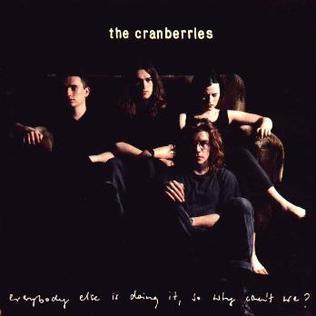Dolores O'Riordan: Missing You "When You're Gone"
 "And in the day
"And in the dayEverything's complex
There's nothing simple
When I'm not around you
But I miss you when you're gone
That is what I do..."
~The Cranberries, When You're Gone (1996)
Dolores O'Riordan was laid to rest on Tuesday by her family after a Requiem Mass in the little parish church in Ballybricken, County Limerick—the same church where she grew up singing and playing the organ. This was after a week of shock, public mourning by all of Ireland (along with the sorrow of fans around the world), and still no news on what caused the sudden death of the 46 year old lead singer and songwriter of The Cranberries.
Ah, the Cranberries! My wife and I saw them back in 1995 at Wolf Trap. It was packed, but we were (still) young, newly engaged, not realizing how footloose we were. The music will always be part of our lives, part of "the soundtrack" of a precious, unforgettable time. We share the gratitude of the Gen-Xers and early Millennials who were growing up with this special music in a remarkable period of musical creativity.
Poor Dolores Mary Eileen O'Riordan. What happened!??
She had a very difficult life.
Certainly it wasn't easy being the frontwoman of the second most famous popular music band in Irish history. It would have been simpler for her and the lads from Limerick (Noel and Mike Hogan and Fergal Lawler) if rock-superstardom had never come so suddenly in 1993, if they had spent their music career as a band playing in pubs.
They wouldn't have been disappointed. They never dreamed of massive global success with all its dazzle and attention and its grueling (inhuman, really) demands. It was exhausting for Dolores, and it exacerbated all the deeper problems that no one knew she had at the time.
 What made The Cranberries so remarkable? The band laid down a simple mellow rhythmic background and Dolores carried the melodies with her Irish soprano voice, which was a peculiar mix of ethereal Celtic floating, choir girl precision, alternative-rock edginess, and Gaelic-country-folk sounds, all topped off with riffs of yodeling.
What made The Cranberries so remarkable? The band laid down a simple mellow rhythmic background and Dolores carried the melodies with her Irish soprano voice, which was a peculiar mix of ethereal Celtic floating, choir girl precision, alternative-rock edginess, and Gaelic-country-folk sounds, all topped off with riffs of yodeling.That description makes it seem complicated. In reality Dolores blended it organically into her own signature style. The result was a band that made songs that were a little odd, a bit fringy, definitely original but also catchy and accessible. They had the broad appeal not of cheap novelty hits that everyone forgets in 6 months, but of classic songs that endure, that people never get tired of.
They also came on the scene with the kind of creative "kick" that put the "alternative" in the alternative music vibe of the 1990s. It was not unusual in those days to hear for the first time a new song from some hitherto obscure band and have your socks knocked off. I remember hearing Dreams, and thinking "this is nice, yeah" and then suddenly in the middle of the song there's a bridge where she launches into the yodel, like "laahh haa ya hay yah ya hay yah ey ahh haa ya hay yah ya hay yah haah yaaaah!" And I went, "Dang! What was that? That was terrific!"
The entire album was terrific. The second one was even better, with the uncharacteristically loud epic Zombie hitting the nail on the head about "the Troubles" of Northern Ireland in a way that continues to resonate with other conflicts and all the agonizing, ideologically driven, stupid violence of today. The songs on these albums were not complicated, but all the pieces were in the right place....
 How is it possible that Dolores O'Riordan died last week!?
How is it possible that Dolores O'Riordan died last week!?For me this hits harder than the increasingly common but still remote deaths of "celebrities" that I remember from my younger days. I kept up with the Cranberries, their periodic reunions, and Dolores's private and public joys and troubles.
I appreciated her honesty and openness about her suffering, and could relate to some aspects of it. This lady from the countryside of western Ireland—usually reticent, polite (when she wasn't manic), unvarnished, and matter-of-fact in her speech—told the world a lot about her life.
It was a life of physical and mental affliction: bipolar disorder with deep depression episodes, trauma from childhood sexual abuse by someone close to her family, anorexia, alcohol misuse, and (more recently) a very painful chronic back problem. She did love music, though. She also had a marriage that was happy at least for a while and three children to whom she was very devoted. She attempted suicide five years ago, but seemed to be pulling things together. The Cranberries were making new music.
What happened!??
Published on January 24, 2018 19:06
No comments have been added yet.



